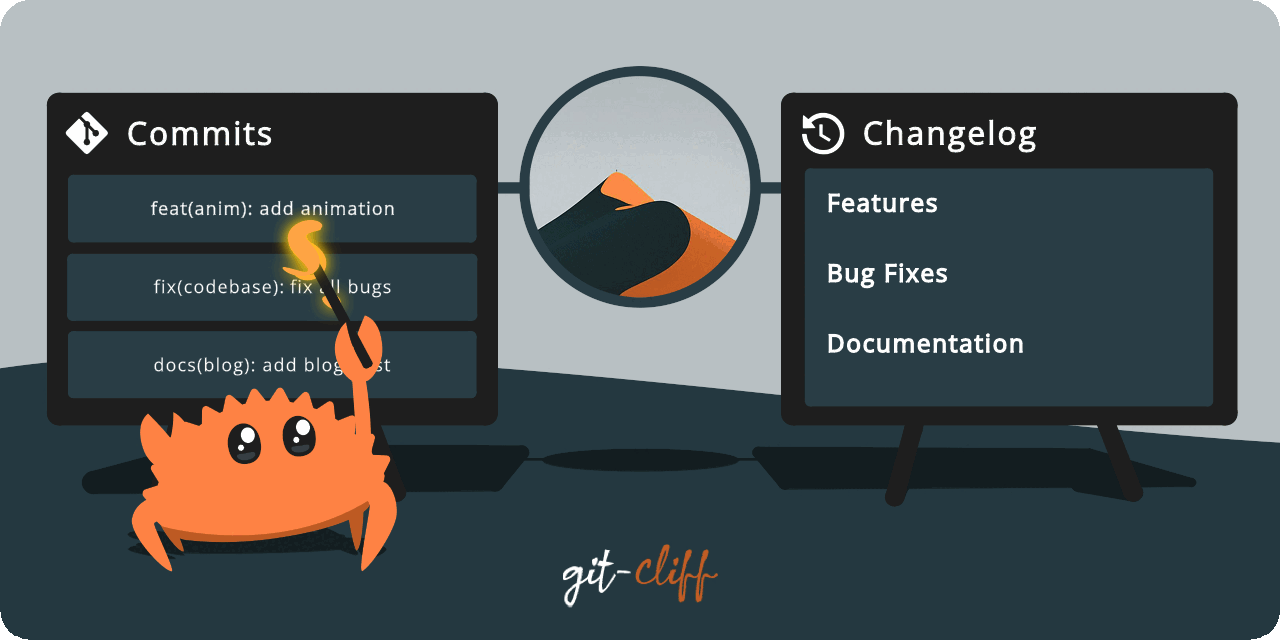Git-Cliff: Automated Changelog Generation
Git-Cliff is a powerful tool for automatically generating changelogs from your Git commit history. By following a structured commit message convention, you can effortlessly create professional changelogs for your projects.
Why git-cliff?
- Automated Changelog Generation: Save time by generating changelogs directly from commit messages.
- Customizable: Define your own rules for grouping commits and formatting the changelog.
- Supports Conventional Commits: Works seamlessly with the widely-used Conventional Commits standard.
Commit Message Format
To get the best results with git-cliff, use the Conventional Commit format:
<type>(<scope>): <description>
<body>
<footer>
Key Points:
- Type: The category of the change (feat, fix, docs, etc.).
feat: A new feature or functionality.fix: A bug fix.docs: Changes to documentation only.style: Code style changes (formatting, indentation, etc.) that do not affect behavior.refactor: Code changes that neither fix bugs nor add features (e.g., code improvements).test: Adding or modifying tests.chore: Non-code tasks (e.g., build system, CI/CD changes).perf: Performance optimization or improvements.build: Changes to the build system or dependencies (e.g., upgrading dependencies).ci: Changes to CI/CD configuration or scripts.revert: Reverting a previous commit.config: Updates to configuration files.deps: Dependency updates (similar to build but specific to libraries/modules).hotfix: Quick fixes for critical bugs (common in agile projects).
- Scope: The specific area/module impacted (optional).
api: API-related changes or endpoints.auth: Authentication and authorization.db: Database-related changes (e.g., schema updates).ui: User interface components.ux: User experience or design improvements.core: Core functionality or utilities.docs: Documentation updates or files.deps: Dependency management (adding, removing, or updating libraries).config: Configuration files or environment settings.build: Build process or pipeline (e.g., webpack, Docker, Makefiles).ci: Continuous Integration/Delivery pipelines.i18n: Internationalization and localization.testing: Testing frameworks or test cases.security: Security updates or fixes.routing: Routing and navigation logic.logging: Logging and monitoring.metrics: Application metrics and telemetry.styles: Styling updates (e.g., CSS or theming).infra: Infrastructure-related changes.deps: Dependency changes (similar to build but more focused).
- Description: A short, imperative description of the change.
- Body: Additional context or motivation (optional).
- Footer: Notes for breaking changes or issue references (optional).
Examples
New Feature
feat(ui): add dark mode toggle
Added a dark mode toggle to the settings menu, allowing users to switch
between light and dark themes.
Bug Fix
fix(api): resolve null pointer exception on login
Fixed an issue where the login API would throw a null pointer exception
if the email field was missing.
Breaking Change
feat(auth): migrate to OAuth2
BREAKING CHANGE: Updated the authentication system to use OAuth2.
Existing users must update their access tokens.
Configuration
Here’s an example .git-cliff.toml configuration file to customize the changelog:
My custom configuration
Getting started
- Install
git-cliffcargo install git-cliff - Initialise
git-cliffor create agit cliff --init.git-cliff.tomlfile in your project directory. - Generate: Run the following command to create a changelog:
git cliff -o CHANGELOG.md

